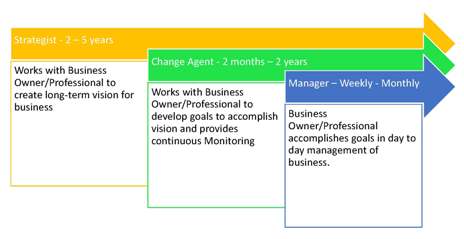A couple weeks ago I went to a dinner meeting where Dean Lee Perry spoke, he serves as the dean of the Marriott School of Management at Brigham Young University. Moral and Ethical Leadership was his message, specifically, issues around a composite view of leadership. This message was of particular interest to me because assisting business owners and professionals to become financially self-reliant, is what I enjoy most about my work.
The composite view of leadership breaks the rolls down into three separate, but equally important types of leaders: the strategist, the change agent, and the manager. This applies directly to my business of helping small business owners/professionals get more out of their businesses and secure their future happiness by engaging sound financial principles that lead to self-reliance. As a Personal CFO to business owners/professionals I help them find and address the right questions and answers to financial issues they face.
The Strategist
The strategist has a long term view with a vision, typically two to five years out. Some financial issue extend well beyond five years. The strategist works closely with the owner/professional to develop a vision for their business. This is where, for many clients, questions about business planning strategies, income tax strategies, retirement planning or estate planning come into play. These events are usually off in the distance, sometimes so far off that we cannot see them over the horizon, but the date will come sooner than we may think.
What strategies should be employed to make this season of life well prepared for, planned, and most of all enjoyed. The abundant life is possible for each of us; long term planning is necessary to obtain the fruits of our efforts. An apple tree must be planted before we can harvest apples years later.
The Change Agent
The change agent works on more immediate mid-term goals, which are necessary to put the proper habits, tools and mental attitude in place to make the vision a reality. Goals that support the vision in a plan may have a dozen or so recommendations. Together the change agent and the owner/professional work through implementation and continuous monitoring of a comprehensive financial plan. Many goals can be accomplished in a few weeks to two years, each supporting the long-term vision.
Within two to six months most all recommendations of a financial plan are implemented, then the plan is monitored long term. An example of implementation may be setting up a particular retirement plan, or implementing an income tax strategy to help save tax dollars. The change agent’s work may finish in a few months only to start work again the next year as life events, business conditions, the economy, may require alterations.
The goals are best reached with regular monitoring, which keeps the whole plan moving forward instead of operating from financial one crisis to another. Bumps in the road happent, but they are often smoothed out with continuous monitoring and interaction with the business owner/professional and myself the personal CFO. Many issues are easily solved when dealt with immediately rather than trying to fix them after the fact, thus keeping the goals on target.
The Manager
The manager is critically important to the whole process of successfully completing goals and making the vision a reality. (Note: in this case the manager is not the typical middle manager in a company, the manager is the owner/professional.) The manager works the plan minute by minute, hour by hour, and day by day. The position of building profitable efficiencies into the operations of the business, is where the “rubber hits the road”! Particularly in small businesses where the owner may work closely with the employees, or often the case in professional practices, where they may do most all the work.
In a small business the owner/professional is often the manager, change agent, and strategist. The work of doing all three positions affectively is often overwhelming. My practice is centered on assisting the owner/professional with the strategist and change agent positions so they can spend more time focusing on what they are good at: growing their business, providing their customers the best service from the day to day operations of their business, and spending more quality family time.
Working closely with the owner/professional on creating a vision and the goals to accomplish that vision, we are able to make progress towards a life of financial self-reliance. Look for my article next week where I will look at how this works with a particular profession.


